Sleeping at the Starlite Motel: And Other Adventures on the Way Back Home
Autor Bailey Whiteen Limba Engleză Paperback – 31 mar 1996
Preț: 96.33 lei
Nou
Puncte Express: 144
Preț estimativ în valută:
18.44€ • 20.04$ • 15.50£
18.44€ • 20.04$ • 15.50£
Carte disponibilă
Livrare economică 31 martie-14 aprilie
Preluare comenzi: 021 569.72.76
Specificații
ISBN-13: 9780679770152
ISBN-10: 0679770151
Pagini: 256
Dimensiuni: 130 x 203 x 15 mm
Greutate: 0.23 kg
Editura: Vintage Publishing
ISBN-10: 0679770151
Pagini: 256
Dimensiuni: 130 x 203 x 15 mm
Greutate: 0.23 kg
Editura: Vintage Publishing
Extras
CIVILIZED FRIENDS
ONE OF MY DEAREST CHILDHOOD FRIENDS HAS lived for the past twenty-five years in Paris, where she teaches English to French people. I see Alma only once a year, when she comes home to visit her family for a couple of weeks. She calls me up when she gets here, and I go over to her mother's house in the afternoon, and we sit in the living room and drink tea.
Sometimes I try to talk Alma into doing some of the things I enjoy-swimming in the deep springs and sinkholes in north Florida, or just taking a long walk in the woods in the late afternoon. But Alma says that something about living in Paris for so many years has caused her to develop an irrational fear of the natural world.
"But it's not like we're in the wilds of Borneo," I tell her. "What exactly are you afraid of?" I'm thinking if I can comfort her with a few reassuring facts, she will lose her fears.
Alma says, "I'm afraid an insect will bite me, or I'll fall over or be scratched by a tree."
"Well, Alma," I say, "have another cup of tea."
On other visits, Alma tries to talk me into coming to see her in Paris. She describes her fascinating cosmopolitan friends, and peculiar little museums she knows about, and wonderful cheeses.
But I tell Alma I just can't get up my nerve to go there.
"What exactly are you afraid of?" she asks me.
And I say, "I'm afraid I will find myself abandoned in the middle of a busy intersection, and I will stand there and stand there, trying to find the courage to cross the street, and cars will whizz by in five or six directions, and their drivers will blow their horns and shout at me in a language I do not speak. And eventually I will wither up and be blown away like a piece of ash and lost in the gray shadows of a great city far from home."
Alma thinks for a while. "Have another cup of tea, Bailey," she says.
And in the end I don't really regret that Alma and I can't share the things we each love best. I'm just happy that we are both so civilized we can sustain a friendship for twenty-five years on nothing more than cups of tea and conversation.
THE FIRST MEMORY I have in this life is of a blackened and petrified dog, curled up in a glass case in a museum in Pompeii. I remember his humped-up back, his little rat tail, and his amazingly well preserved feet, with the pads and toenails still intact. I do not recall my mother's explanation of the museum exhibits at Pompeii, but it must have been effective, because just as clearly as I remember the physiognomy of that charred dog, I remember comprehending for the first time, gazing through the beveled glass, the meaning of distance and the steady passage of time.
Now the things I see when I am far from home sometimes appear as if they are in a display case, like that dog in Pompeii, and once again I feel the charm of distance. At the checkout stand in a sparsely supplied grocery store near Chinle, Arizona, a filthy dirty man in front of me tells me that since he moved to Arizona from Oregon he has developed painful cracks in the tips of his fingers. "It's the dry," he says and holds up a finger. Sure enough there is a deep red crack. But what I notice is that three of the other fingers are missing completely. Just little stumps are left.
I swallow and say, "Try calendula cream."
In my own town I know the story of every missing body part: an ear in an auto accident, a middle finger in a miscalculation at a table saw, a thumb in a freak accident involving a white horse and a Chrysler coupe. It is one of the joys of distance to realize that I will never know what happened to the three fingers of that man in Chinle, Arizona. As I watch him walk out of the grocery store and into the sweltering parking lot, a bag of groceries under each arm, I can almost see the sheen on the beveled glass front of that dark mahogany case in Pompeii.
In a park in Cambridge, Massachusetts, one summer afternoon I befriend a little old retired Latin teacher. She tells me about the Peloponnesian War and feeds pigeons.
"People don't think much of pigeons," she says, "but they are remarkable birds."
"Yes," I say, "they do have those lovely colored feathers on their necks."
"Not only that, my dear," she says. "They have lovely minds."
But I have to catch a train, so I can't stay to learn more about the minds of pigeons, or the Peloponnesian War, or the Latin teacher's nineteen-year-old deaf white cat with diabetes.
And some winter day, not too long from now, when I'm at home in the Georgia sunshine planting anemones, that old Latin teacher will die in her apartment in Cambridge. In the next weeks, when my anemones are putting up their first ferny leaves, her apartment will be sold, her deaf white cat euthanized, and at 12:15 every afternoon the pigeons will gather in the park and stomp around in the cold on their chubby pink feet. One early spring day, for no reason at all, I'll look at a bunch of anemones on my kitchen table and see that mahogany glass case. There will be the old woman, tossing a handful of seeds and saying, "Not only that, my dear-they have lovely minds."
When I was a little girl I found an irregularity in the wood grain on the end of a bookcase in my house that made a picture of a squealing pig trussed up by his hind legs and dangling head down from a tree limb. When I came home from that trip to Pompeii, I remember scrambling down from my mother's arms and running from room to room in our house, breathing the fragrance of home and looking for that picture in the wood grain. Sure enough, after all that time and distance, the pig was still there. It was comforting, that pig and the smell of home.
And it is still a comfort to come back from traveling, with my random memories like a display in some Victorian museum of miscellany, to a home full of people whose lives I know so well that I can tell the story of every missing finger and call every old lady's cat by name. I've found it's a pleasing balance, the charred dog against the squealing pig.
FAMILY VALUES
MY AUNT ELEANOR WAS TAKING A SHOWER THE other day when the whole bathroom fell right through the floor and landed in the dust under the house. Dripping wet and all lathered up, picking soap and tile grout out of her ears, Aunt Eleanor crawled out of the debris and through the startled doodlebugs.
Actually, every good family has a story of a spectacular plumbing disaster. The finer the family, the more wonderful the story.
"Your great-uncle Melville," said Aunt Eleanor wistfully, "came through the ceiling from a second-floor bathroom, right over the dining-room table when Pamela was having her garden club luncheon." She reflected bitterly. "And we have sunk to this."
I knew what she meant. A simple plunge from the ground floor, and no guests in the house at the time. There's no denying that our family has degenerated over the years: the family fortune frittered away, the big house sold. We are probably not up to a second-floor plumbing disaster involving chandeliers and crown moldings.
"Are you all right?" I asked Aunt Eleanor, trying to change the subject. "Do you feel as if all your back bones are fused together from the impact?"
"I feel fine," she snapped, "just humiliated."
"Actually," I said, "nowadays people are judged more by the clothes they wear, the kinds of cars they drive, and where they go on vacation. Determining social status by plumbing calamities has become obsolete."
Aunt Eleanor sighed. "I'm old-fashioned, I guess," she said.
The plumber told her that most houses these days are built on concrete slabs, so there's no potential for accidents like the one she had. He recommended a fiberglass tub and shower unit. "You'll never have another problem," he said.
I went to town and bought Aunt Eleanor a $60 linen skirt and a gold watch. She smoothed down the pleats of the skirt and strapped the watch on her arm. She thanked me, but she didn't look impressed.
"Concrete slab," she muttered. "Fiberglass." She sank into the moth-eaten down cushion on her Chippendale chair, closed her eyes, and let her mind drift back over the years to a time when our family would have been ranked number one in the Grady County equivalent of Burke's Peerage, when the women were ladies and wore white lawn, and the men were gentlemen and smoked fine cigars. "Shot right through the ceiling medallion he did, your great-uncle Melville," Aunt Eleanor said dreamily, "and landed in the tomato aspic. Now there's style. There's class. There's breeding."
ASHES
IT WAS A MOONLIT SUMMER NIGHT. FROM BEHIND the two tea olive trees came a scuttling sound, a little scrape, and a rattle. It was my grandmother, trying again to sprinkle Aunt Rose's ashes in the garden. Then from the upstairs porch my grandfather's voice roared down.
"Ida!"
"Yes, Jaz?"
"I'll not have this sprinkling of ashes!"
"Yes, Jaz."
My grandfather was peculiar about death. He didn't like to acknowledge it, as if he felt that, like the tree falling in the forest, unobserved it would not exist. His resistance made things difficult for my grandmother, who had made a deathbed promise to sprinkle Rose's ashes in the old garden Rose and her sister, my grandfather's mother, had planted in their youth. Unlike her nephew, Aunt Rose had found a kind of inspiration in mortality.
"Your uncle Lund died under that quilt, my dear," she would say cozily, carefully smoothing out the creases. On the mantelpiece she displayed photographs of dead people, propped up in their coffins, looking glum. And on the wall were framed floral scenes in shades of brown and tan, woven from the hair of departed loved ones.
Of course, Aunt Rose had elaborate plans for her own death and dispersal. When she was in her forties she embroidered herself a fine white-on-white linen shroud. And as she lay at last on her deathbed, beatifically wasting away, her old fingers stroking the white silk flowers on the heavy linen, she made my grandmother promise that her ashes would be sprinkled on a moonlit summer night in the old garden of her childhood home and that her favorite poem would be recited:
"'God wot!'" she murmured fraily, sinking into a theatrical delirium, "'fringed pool, rose plot, ferned grot . . . Nay, but I have a sign . . .'" and she raised a trembling finger. "''Tis very sure God walks in mine.'" Then she closed her eyes and died perfectly.
But for ten years my grandfather's proscription held fast, and Aunt Rose's ashes moldered in their gilt and alabaster urn on the mantelshelf in a downstairs front room.
"I'll not have this sprinkling of ashes," he would command at the breakfast table the morning after every one of my grandmother's attempts. And she would silently bow her head over her oatmeal and calculate the date of the next full moon, when she would try again to keep her promise.
When it got to be my grandfather's turn to die, things were different. Where Aunt Rose had lain in her bed, peaceful and relaxed with a little smile on her pale lips, enjoying the melodrama and the opportunity her own death gave for displays of fine crewelwork, my grandfather lay as tight as a knot, gripping the sheets.
"He's hard to die," people said and shook their heads.
"Don't let him put his hands on me. Don't let him put his hands on me," my grandfather raved. He meant the undertaker, and after he finally died, his wide-open eyes staring at the light, my grandmother had to follow his body to the crematorium, making sure at every stage that the undertaker did not lay a hand on it.
Carrying out the deathbed wishes of lunatics made my grandmother a little impatient with the subject herself, and in the spirit of efficiency she disposed of both Aunt Rose and my grandfather on the same moonlit summer night. She sprinkled Aunt Rose with her favorite little poem, hastily recited, in the old garden, as requested, and nearby, using a posthole digger, she buried my grandfather's ashes in a cardboard box, without ceremony, as he would have wished.
On the subject of her own death she was unequivocal. "Do whatever you want to," she told us. "I just don't want to be trouble to anybody," she added with an exasperated sigh. When the time came, it seemed the right thing to do to sprinkle her in the garden with everybody else. No poetry was read, since no one could think offhand of anything fitting, and it didn't seem appropriate to go to the trouble of looking into The Oxford Book of English Verse. We sprinkled her ashes in daylight, when no one would have to lose any sleep over it, and that was that.
Years went by, times changed, and the family fortune dwindled. My uncle, who was the last member of the family to own that house, worked for a living and raised four children in his spare time. It was not possible to maintain the formal garden in its 1890s elegance, and weeds spread over the raked gravel paths, the boxwood hedges grew leggy and shapeless, and the fringed pool filled with leaves and muck. Then in the 1970s my uncle sold the house, and it was turned into an inn. Once again people of leisure stroll through the round rose bed, linger under the two old tea olive trees, and sit on the stone bench among the ferns.
It is said that ghosts come out and wander around when they are dissatisfied. Sometimes I wonder about those three laid to rest in the old garden. My grandparents are content and peaceful, I'm sure-my grandfather in the knowledge that none of the strangers walking in the garden knows that he did such a shameful thing as die, my grandmother in the knowledge that maintaining the house and garden are no longer any trouble to her family and that my uncle now lives in a comfortable modern house in town. The only one who might come out on moonlit nights and glide around, unsettled, is Rose, wanting some attention. Yet I'm sure every now and then a guest in the downstairs front room must notice the faint rust ring on the mantelshelf and trace around it with her finger and idly think that someone must have set a glass down there one evening and left it overnight, marring the finish.
ONE OF MY DEAREST CHILDHOOD FRIENDS HAS lived for the past twenty-five years in Paris, where she teaches English to French people. I see Alma only once a year, when she comes home to visit her family for a couple of weeks. She calls me up when she gets here, and I go over to her mother's house in the afternoon, and we sit in the living room and drink tea.
Sometimes I try to talk Alma into doing some of the things I enjoy-swimming in the deep springs and sinkholes in north Florida, or just taking a long walk in the woods in the late afternoon. But Alma says that something about living in Paris for so many years has caused her to develop an irrational fear of the natural world.
"But it's not like we're in the wilds of Borneo," I tell her. "What exactly are you afraid of?" I'm thinking if I can comfort her with a few reassuring facts, she will lose her fears.
Alma says, "I'm afraid an insect will bite me, or I'll fall over or be scratched by a tree."
"Well, Alma," I say, "have another cup of tea."
On other visits, Alma tries to talk me into coming to see her in Paris. She describes her fascinating cosmopolitan friends, and peculiar little museums she knows about, and wonderful cheeses.
But I tell Alma I just can't get up my nerve to go there.
"What exactly are you afraid of?" she asks me.
And I say, "I'm afraid I will find myself abandoned in the middle of a busy intersection, and I will stand there and stand there, trying to find the courage to cross the street, and cars will whizz by in five or six directions, and their drivers will blow their horns and shout at me in a language I do not speak. And eventually I will wither up and be blown away like a piece of ash and lost in the gray shadows of a great city far from home."
Alma thinks for a while. "Have another cup of tea, Bailey," she says.
And in the end I don't really regret that Alma and I can't share the things we each love best. I'm just happy that we are both so civilized we can sustain a friendship for twenty-five years on nothing more than cups of tea and conversation.
THE FIRST MEMORY I have in this life is of a blackened and petrified dog, curled up in a glass case in a museum in Pompeii. I remember his humped-up back, his little rat tail, and his amazingly well preserved feet, with the pads and toenails still intact. I do not recall my mother's explanation of the museum exhibits at Pompeii, but it must have been effective, because just as clearly as I remember the physiognomy of that charred dog, I remember comprehending for the first time, gazing through the beveled glass, the meaning of distance and the steady passage of time.
Now the things I see when I am far from home sometimes appear as if they are in a display case, like that dog in Pompeii, and once again I feel the charm of distance. At the checkout stand in a sparsely supplied grocery store near Chinle, Arizona, a filthy dirty man in front of me tells me that since he moved to Arizona from Oregon he has developed painful cracks in the tips of his fingers. "It's the dry," he says and holds up a finger. Sure enough there is a deep red crack. But what I notice is that three of the other fingers are missing completely. Just little stumps are left.
I swallow and say, "Try calendula cream."
In my own town I know the story of every missing body part: an ear in an auto accident, a middle finger in a miscalculation at a table saw, a thumb in a freak accident involving a white horse and a Chrysler coupe. It is one of the joys of distance to realize that I will never know what happened to the three fingers of that man in Chinle, Arizona. As I watch him walk out of the grocery store and into the sweltering parking lot, a bag of groceries under each arm, I can almost see the sheen on the beveled glass front of that dark mahogany case in Pompeii.
In a park in Cambridge, Massachusetts, one summer afternoon I befriend a little old retired Latin teacher. She tells me about the Peloponnesian War and feeds pigeons.
"People don't think much of pigeons," she says, "but they are remarkable birds."
"Yes," I say, "they do have those lovely colored feathers on their necks."
"Not only that, my dear," she says. "They have lovely minds."
But I have to catch a train, so I can't stay to learn more about the minds of pigeons, or the Peloponnesian War, or the Latin teacher's nineteen-year-old deaf white cat with diabetes.
And some winter day, not too long from now, when I'm at home in the Georgia sunshine planting anemones, that old Latin teacher will die in her apartment in Cambridge. In the next weeks, when my anemones are putting up their first ferny leaves, her apartment will be sold, her deaf white cat euthanized, and at 12:15 every afternoon the pigeons will gather in the park and stomp around in the cold on their chubby pink feet. One early spring day, for no reason at all, I'll look at a bunch of anemones on my kitchen table and see that mahogany glass case. There will be the old woman, tossing a handful of seeds and saying, "Not only that, my dear-they have lovely minds."
When I was a little girl I found an irregularity in the wood grain on the end of a bookcase in my house that made a picture of a squealing pig trussed up by his hind legs and dangling head down from a tree limb. When I came home from that trip to Pompeii, I remember scrambling down from my mother's arms and running from room to room in our house, breathing the fragrance of home and looking for that picture in the wood grain. Sure enough, after all that time and distance, the pig was still there. It was comforting, that pig and the smell of home.
And it is still a comfort to come back from traveling, with my random memories like a display in some Victorian museum of miscellany, to a home full of people whose lives I know so well that I can tell the story of every missing finger and call every old lady's cat by name. I've found it's a pleasing balance, the charred dog against the squealing pig.
FAMILY VALUES
MY AUNT ELEANOR WAS TAKING A SHOWER THE other day when the whole bathroom fell right through the floor and landed in the dust under the house. Dripping wet and all lathered up, picking soap and tile grout out of her ears, Aunt Eleanor crawled out of the debris and through the startled doodlebugs.
Actually, every good family has a story of a spectacular plumbing disaster. The finer the family, the more wonderful the story.
"Your great-uncle Melville," said Aunt Eleanor wistfully, "came through the ceiling from a second-floor bathroom, right over the dining-room table when Pamela was having her garden club luncheon." She reflected bitterly. "And we have sunk to this."
I knew what she meant. A simple plunge from the ground floor, and no guests in the house at the time. There's no denying that our family has degenerated over the years: the family fortune frittered away, the big house sold. We are probably not up to a second-floor plumbing disaster involving chandeliers and crown moldings.
"Are you all right?" I asked Aunt Eleanor, trying to change the subject. "Do you feel as if all your back bones are fused together from the impact?"
"I feel fine," she snapped, "just humiliated."
"Actually," I said, "nowadays people are judged more by the clothes they wear, the kinds of cars they drive, and where they go on vacation. Determining social status by plumbing calamities has become obsolete."
Aunt Eleanor sighed. "I'm old-fashioned, I guess," she said.
The plumber told her that most houses these days are built on concrete slabs, so there's no potential for accidents like the one she had. He recommended a fiberglass tub and shower unit. "You'll never have another problem," he said.
I went to town and bought Aunt Eleanor a $60 linen skirt and a gold watch. She smoothed down the pleats of the skirt and strapped the watch on her arm. She thanked me, but she didn't look impressed.
"Concrete slab," she muttered. "Fiberglass." She sank into the moth-eaten down cushion on her Chippendale chair, closed her eyes, and let her mind drift back over the years to a time when our family would have been ranked number one in the Grady County equivalent of Burke's Peerage, when the women were ladies and wore white lawn, and the men were gentlemen and smoked fine cigars. "Shot right through the ceiling medallion he did, your great-uncle Melville," Aunt Eleanor said dreamily, "and landed in the tomato aspic. Now there's style. There's class. There's breeding."
ASHES
IT WAS A MOONLIT SUMMER NIGHT. FROM BEHIND the two tea olive trees came a scuttling sound, a little scrape, and a rattle. It was my grandmother, trying again to sprinkle Aunt Rose's ashes in the garden. Then from the upstairs porch my grandfather's voice roared down.
"Ida!"
"Yes, Jaz?"
"I'll not have this sprinkling of ashes!"
"Yes, Jaz."
My grandfather was peculiar about death. He didn't like to acknowledge it, as if he felt that, like the tree falling in the forest, unobserved it would not exist. His resistance made things difficult for my grandmother, who had made a deathbed promise to sprinkle Rose's ashes in the old garden Rose and her sister, my grandfather's mother, had planted in their youth. Unlike her nephew, Aunt Rose had found a kind of inspiration in mortality.
"Your uncle Lund died under that quilt, my dear," she would say cozily, carefully smoothing out the creases. On the mantelpiece she displayed photographs of dead people, propped up in their coffins, looking glum. And on the wall were framed floral scenes in shades of brown and tan, woven from the hair of departed loved ones.
Of course, Aunt Rose had elaborate plans for her own death and dispersal. When she was in her forties she embroidered herself a fine white-on-white linen shroud. And as she lay at last on her deathbed, beatifically wasting away, her old fingers stroking the white silk flowers on the heavy linen, she made my grandmother promise that her ashes would be sprinkled on a moonlit summer night in the old garden of her childhood home and that her favorite poem would be recited:
"'God wot!'" she murmured fraily, sinking into a theatrical delirium, "'fringed pool, rose plot, ferned grot . . . Nay, but I have a sign . . .'" and she raised a trembling finger. "''Tis very sure God walks in mine.'" Then she closed her eyes and died perfectly.
But for ten years my grandfather's proscription held fast, and Aunt Rose's ashes moldered in their gilt and alabaster urn on the mantelshelf in a downstairs front room.
"I'll not have this sprinkling of ashes," he would command at the breakfast table the morning after every one of my grandmother's attempts. And she would silently bow her head over her oatmeal and calculate the date of the next full moon, when she would try again to keep her promise.
When it got to be my grandfather's turn to die, things were different. Where Aunt Rose had lain in her bed, peaceful and relaxed with a little smile on her pale lips, enjoying the melodrama and the opportunity her own death gave for displays of fine crewelwork, my grandfather lay as tight as a knot, gripping the sheets.
"He's hard to die," people said and shook their heads.
"Don't let him put his hands on me. Don't let him put his hands on me," my grandfather raved. He meant the undertaker, and after he finally died, his wide-open eyes staring at the light, my grandmother had to follow his body to the crematorium, making sure at every stage that the undertaker did not lay a hand on it.
Carrying out the deathbed wishes of lunatics made my grandmother a little impatient with the subject herself, and in the spirit of efficiency she disposed of both Aunt Rose and my grandfather on the same moonlit summer night. She sprinkled Aunt Rose with her favorite little poem, hastily recited, in the old garden, as requested, and nearby, using a posthole digger, she buried my grandfather's ashes in a cardboard box, without ceremony, as he would have wished.
On the subject of her own death she was unequivocal. "Do whatever you want to," she told us. "I just don't want to be trouble to anybody," she added with an exasperated sigh. When the time came, it seemed the right thing to do to sprinkle her in the garden with everybody else. No poetry was read, since no one could think offhand of anything fitting, and it didn't seem appropriate to go to the trouble of looking into The Oxford Book of English Verse. We sprinkled her ashes in daylight, when no one would have to lose any sleep over it, and that was that.
Years went by, times changed, and the family fortune dwindled. My uncle, who was the last member of the family to own that house, worked for a living and raised four children in his spare time. It was not possible to maintain the formal garden in its 1890s elegance, and weeds spread over the raked gravel paths, the boxwood hedges grew leggy and shapeless, and the fringed pool filled with leaves and muck. Then in the 1970s my uncle sold the house, and it was turned into an inn. Once again people of leisure stroll through the round rose bed, linger under the two old tea olive trees, and sit on the stone bench among the ferns.
It is said that ghosts come out and wander around when they are dissatisfied. Sometimes I wonder about those three laid to rest in the old garden. My grandparents are content and peaceful, I'm sure-my grandfather in the knowledge that none of the strangers walking in the garden knows that he did such a shameful thing as die, my grandmother in the knowledge that maintaining the house and garden are no longer any trouble to her family and that my uncle now lives in a comfortable modern house in town. The only one who might come out on moonlit nights and glide around, unsettled, is Rose, wanting some attention. Yet I'm sure every now and then a guest in the downstairs front room must notice the faint rust ring on the mantelshelf and trace around it with her finger and idly think that someone must have set a glass down there one evening and left it overnight, marring the finish.
Descriere
Anyone who has read her bestseller Mama Makes Up Her Mind--or who has heard her on National Public Radio--knows that Bailey White is one of the keenest observers of Southern eccentricity since Mark Twain. Sleeping at the Starlite Motel revives White's reputation as a master storyteller, Southern division, as it catalogs the oddities of the Georgia town she knwons so well.
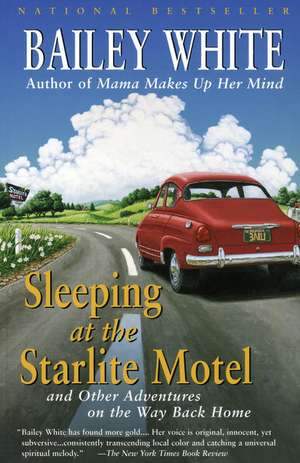


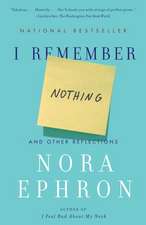
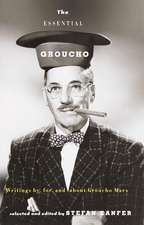
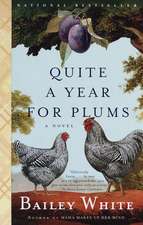

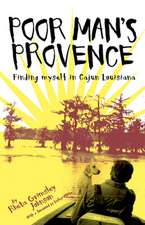
![The Thing About Work: Showing Up and Other Important Matters [A Worker's Manual]](https://i3.books-express.ro/bt/9781629561585/the-thing-about-work.jpg)
